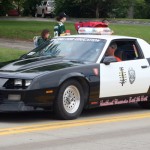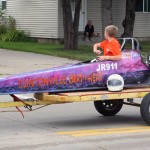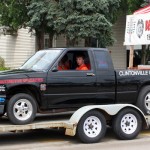Clintonville group brought cops, kids together
By Bert Lehman
The Beat the Heat chapter in Clintonville has ceased operations and will dissolve.
Clintonville Chief of Police Terry Lorge, who has been in charge of the Beat the Heat chapter in Clintonville, said the program will end due to lack of interest.
“Last year I had eight students in the program and six of them graduated,” Lorge said. “Two more were still involved and I said as long as they wanted to keep racing I would keep doing it, but they graduated this year. I thought if there is ever a time to discontinue it, it’s going to be now because I’m not kicking anybody out. We tried to see if any other students were interested and there has been very little interest in it. So I think now is the time.”
Chapter history
Lorge said there are around 270 Beat the Heat chapters around the country.
“The ones that we have in Wisconsin are unique in that we actually build the cars with the kids and compete and race with the kids,” Lorge said.
Lorge started the Beat the Heat chapter in Clintonville in 1994.
“It was either the first or second year we had 26 students. We really had a lot of students here and it really took off real fast. I would say on average, over the years, I’ve averaged between 10 and 15 students.”
Students who were part of the program met one or two nights per week to work on the race vehicles that were part of the program. At one point the Clintonville chapter had three vehicles — a mid-1980s Chevy S-10 pick-up and a junior dragster that students raced, and a 1989 Camaro racing police car.
“We build them, and maintain them,” Lorge said.
The Beat the Heat program wasn’t part of the school curriculum, but Lorge said he had full cooperation to use the school’s shop to work on the race vehicles. Lorge’s shop at his home was also used.
The program
In exchanged for building and maintaining the vehicles, the students involved in the program received the opportunity to drag race at various drag strips. The drag strip used the most was the one at Wisconsin International Raceway in Kaukauna.
He said it started out as participants having the opportunity to race against police officers in racing police cars.
“We would generally give the student a head start and we’d try to chase them down,” Lorge said.
During the height of the Beat the Heat program in Wisconsin, Lorge said there were 14 chapters in northeast Wisconsin. Students would race against each other, and some nights there would be more than 250 competitors.
“At the races we had a separate points race where the kids would race and they would earn points for their school and they could also race individually for an individual points championship,” Lorge said.
Racing against police officers also remained part of the program.
“It was just a good time,” Lorge said.
Students have also raced at the drag strip in Union Grove in Wisconsin, and several drag strips in Illinois, including one near Chicago.
“We’ve traveled around, we’ve done a lot of field trips with the kids,” Lorge said.
From 1996 to 2007 Lorge said he’d take the Beat the Heat students to be spectators at a large drag racing event Labor Day weekend in Indianapolis. They’d camp at a campsite across the road from the track and stay three or four days.
“That was kind of the award for being in the program and staying out of trouble, we’d go to the U.S. Nationals every year,” Lorge said.
The end
When the economy took a turn for the worse, Lorge said the Beat the Heat program began to dwindle.
“And a big part of it is the students don’t have an interest that young people used to have,” he said. “When I was a kid growing up, the most important thing in your life was getting a driver’s license and getting your first car. Now it’s not as important.
“Another aspect is the kids are not able to work on the cars like we used to be able to. Everything is computerized. You need very expensive diagnostic equipment and it’s very hard to work on current cars that are being manufactured.”
Lorge said when the program was at its strongest, 300-400 hours a year were spent in the program.
“For us in the community here, it’s kind of run its course,” Lorge said.
The Clintonville chapter isn’t alone, as Lorge said several other area chapters have closed in recent years.
“This program has helped me realize we have a lot of great kids in this community,” Lorge said. “A lot of them have grown up and gone into the automotive industry.”
Lorge was quick to say that he couldn’t have run the program alone.
“There have been a lot of people who have helped me out too. It hasn’t been just me by any stretch,” Lorge said. “We’ve had a lot of support from business and industry with donations and equipment.”
Lorge said Craig Hodne has also been a key factor in the Beat the Heat program and the Spring Cruise Car Show, which was a fundraiser for the program. Hodne was involved for 18 years and managed all the finances and record keeping. He also helped teach the kids about automotive technology.
The Spring Cruise Car Show will continue, Lorge said.
“The plan of the group would be to create a nonprofit group called Spring Cruise Inc. It would be a community event but it would be governed and run by this group of people,” Lorge said.
In closing the chapter, Lorge said he was thankful for all the help he received over the years.
“I’d like to say that for everybody who helped make the program work for the last 22 years in Clintonville, I want to thank them,” Lorge said. “For all the kids who have gone through this program and moved on to better things I want to thank them. It’s been a good run, but it’s time to close up shop.”



